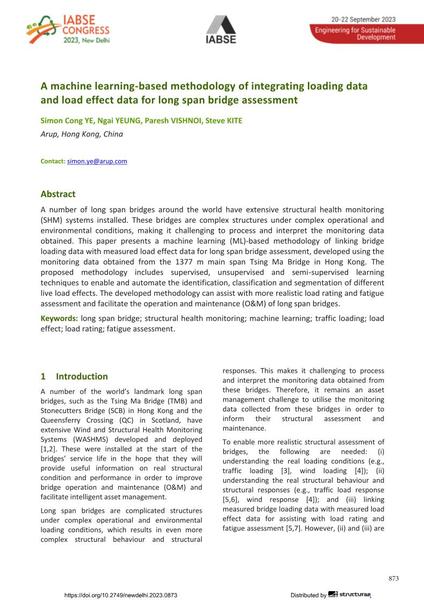A machine learning-based methodology of integrating loading data and load effect data for long span bridge assessment

|
|
|||||||||||
Bibliographic Details
| Author(s): |
Simon Cong Ye
(Arup, Hong Kong, China)
Ngai Yeung (Arup, Hong Kong, China) Paresh Vishnoi (Arup, Hong Kong, China) Steve Kite (Arup, Hong Kong, China) |
||||
|---|---|---|---|---|---|
| Medium: | conference paper | ||||
| Language(s): | English | ||||
| Conference: | IABSE Congress: Engineering for Sustainable Development, New Delhi, India, 20-22 September 2023 | ||||
| Published in: | IABSE Congress New Delhi 2023 | ||||
|
|||||
| Page(s): | 873-881 | ||||
| Total no. of pages: | 9 | ||||
| DOI: | 10.2749/newdelhi.2023.0873 | ||||
| Abstract: |
A number of long span bridges around the world have extensive structural health monitoring (SHM} systems installed. These bridges are complex structures under complex operational and environmental conditions, making it challenging to process and interpret the monitoring data obtained. This paper presents a machine learning (ML}-based methodology of linking bridge loading data with measured load effect data for long span bridge assessment, developed using the monitoring data obtained from the 1377 m main span Tsing Ma Bridge in Hong Kong. The proposed methodology includes supervised, unsupervised and semi-supervised learning techniques to enable and automate the identification, classification and segmentation of different live load effects. The developed methodology can assist with more realistic load rating and fatigue assessment and facilitate the operation and maintenance (O&M} of long span bridges. |
||||
| Keywords: |
fatigue assessment structural health monitoring load rating machine learning traffic loading Long Span Bridge load effect
|
||||
